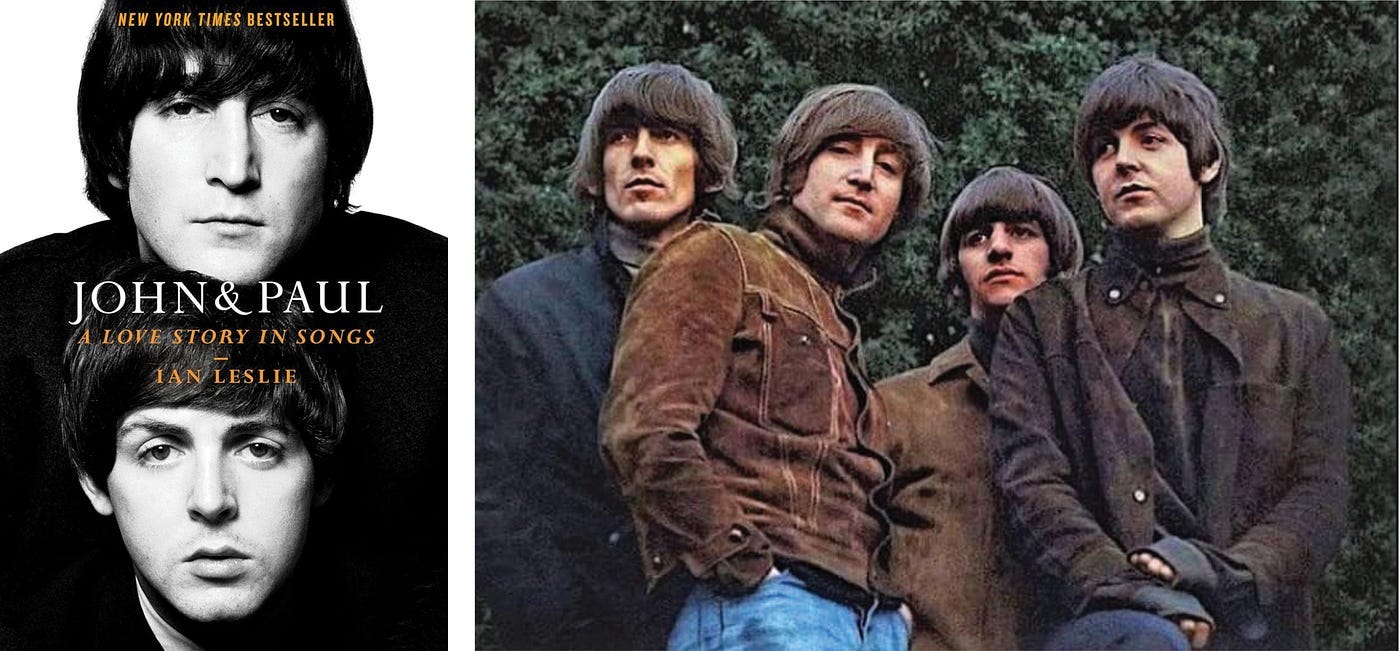I recently finished Ian Leslie’s book John & Paul, and I’m blown away. Some of that is inevitable—I’m a lifelong Beatles obsessive. Every day since childhood I’ve consumed something about them: books, recordings, interviews, documentaries. If there’s a top 0.01% of Beatles fans, I’m in it. Under those circumstances, you’d expect me to enjoy nearly any Beatles book. But this one feels different.
Why? Partly because Leslie is a remarkable writer. His sentences snap, his verbs sing, and he drives a story forward with such momentum that you can’t help but turn the page. But style alone isn’t enough. What makes this book extraordinary is that he captures the essence of John and Paul’s partnership in a way no other writer has—not just as bandmates, not even as co-writers, but as two young men bound in love.
Theirs was not a physical or sexual love. Leslie uses the term “romantic love” and it was indeed something that deep. They were rivals and mirrors, challengers and companions. Their friendship was the engine that powered the Beatles. Leslie makes clear that the century’s greatest cultural phenomenon was born from the spark that flies when two brilliant minds strike together.
This kind of bond once had a name in cultures past, when friendship could carry a weight and intensity we now reserve for romance. Today, it feels almost alien. That’s one reason why their story hits with such force. It reminds us what we’ve lost, and what we might regain, when we honor the fierce, creative, life-shaping friendships that don’t fit neatly into modern categories.
And let’s not be shy about their place in history. The Beatles’ influence belongs beside Homer, Shakespeare, Bach, and Mozart. John and Paul are not merely pop musicians—they are among the great cultural figures of the West. Together, they remade music, fashion, and the texture of modern life. But Leslie’s book reminds us that before they were icons, they were simply two teenagers who found in each other a partner to dream with.
I find it telling that my two favorite modern thinkers—Tyler Cowen and Tom Holland—also confess a deep and abiding love for the Beatles. Perhaps that isn’t coincidence. To love the Beatles is to see the world as alive with possibility, to sense that creativity and friendship can combine to produce more than the sum of their parts.
It’s a Beatles book, yes, but it’s also something bigger: a story about friendship, rivalry, and love—the forces that shape all human lives. That is one of the big lessons of John & Paul. Great art rarely springs from solitude. It is born in the space between two people, in the friction and fusion of shared imagination. And it is a story about us—about how love, in all its forms, enlarges what it touches.
Officially Joining the Cato Institute
I’m pleased to share some professional news: I’ve been named an adjunct scholar with the Cato Institute, the leading libertarian think tank. My work with Cato focuses on constitutional structure, the separation of powers, and free trade—themes at the heart of both America’s founding vision and today’s policy debates. I look forward to contributing to Cato’s important mission of advancing individual liberty, limited government, and open markets.
An Interview with Brad Ricca
In a new Lincoln Log podcast episode I interviewed award-winning author Brad Ricca to discuss his new book, Lincoln’s Ghost: Houdini’s War on Spiritualism and the Dark Conspiracy Against the American Presidency.
Ricca takes us into one of the strangest and most gripping chapters of American history—when Harry Houdini waged a crusade against fraudulent mediums, séances, and a Spiritualist movement that reached all the way to the White House.
You can access the conversation on any major podcast platform, including Spotify, Apple, and Amazon. The conversation is also available on YouTube here.




Congratulations on joining the Cato Institute; you make a great and welcome addition to an impressive list of contributors.
I am convinced that future musicologists will include the Beetles as the fourth "B" of musical geniuses - along with Bach, Beethoven and Brahms.